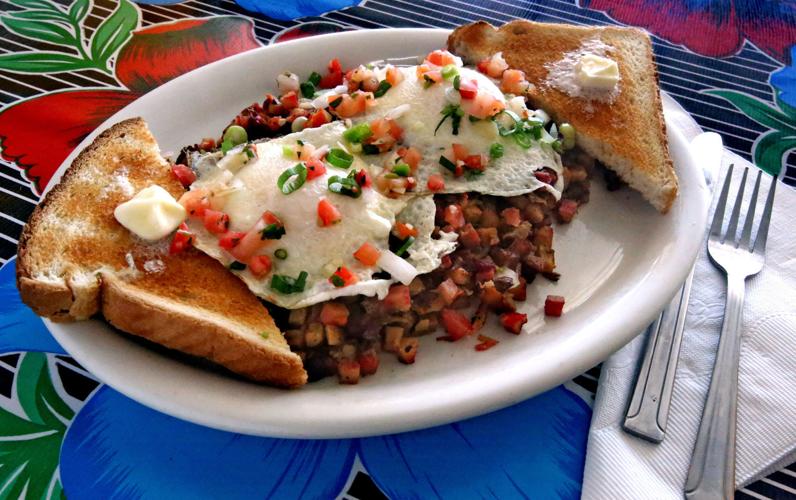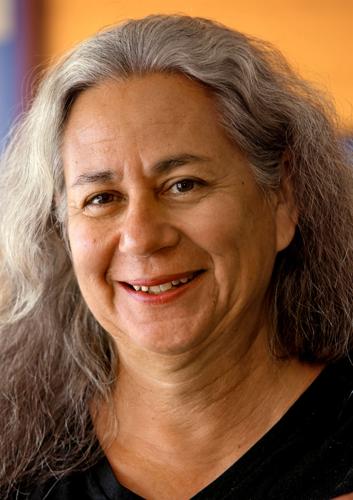Canned corned beef hash had no place on Kelzi Bartholomaei’s menu when she bought Mother Hubbard’s Cafe in 2010.
Bartholomaei grew up in Detroit, dining in the Motor City’s ethnic neighborhood restaurants, including eateries in the Irish enclave of Corktown.
“I bought a restaurant. I didn’t know what I was doing. I knew I would never be happy with two eggs and hash browns and the very first dish I thought I would make to change on the menu was one of my Detroit memories,” Bartholomaei said. “On Sundays we would go into Corktown and get homemade corned beef hash. Every little bar and restaurant made their own corned beef hash and they all had their own character. But the key thing was they were all made fresh.”
Bartholomaei bought a brisket, developed a brine, shredded tender meat, added vegetables and proudly served it up. The problem was, the customers at Mother Hubbard’s — a restaurant known basic cooking for cheap eats — liked the canned stuff better.
“It was so resoundingly panned, 99 percent of my guests, when they went out to breakfast, they wanted canned hash. That was an incredibly mind-expanding experience for me because it made me realize you can’t just change things like that and expect to survive,” Bartholomaei said.
“So I took that item off the menu and I gradually started tweaking this and that a little bit here and a little bit there, so the whole concept of Mother Hubbard’s as it is now, developed organically. I had no game plan when I tried to do it.”
Now, Bartholomaei has made Mother Hubbard’s fully her own. Canned hash — the last holdover from the old menu — was removed four years ago.
Did you always want to be a chef?
“It’s not actually something I kind of strove for. I’m dyslexic and back then they didn’t have a word for that. I was basically the stupid kid in the class, so I got channeled through home ec and that kind of thing. I had an opportunity to cook for a fishing camp and that’s actually what started my professional career. As a backcountry outfitter.”
How did you develop your menu for Mother Hubbard’s?
“I’m a Motown girl, but … I grew up on both borders. I was born in Detroit and during the school year I went to school in Michigan and as soon as the school year ended my parents would pack my brother and I up and send us to what I like to call ‘culture camp’ with my grandparents in Mexico. So I grew up on both borders.
“It had its advantages and disadvantages. I loved my grandparents; it was my grandma who taught me how to cook. That was a very rural area — I mean my uncle’s property, his ranch, didn’t get electricity until ’83. You go from Detroit to very rural Mexico and then you come back and of course the first thing they ask you, ‘What did you do this summer?’ And, when you talk about trimming the wicks on the oils lamps, people in Detroit wonder, ‘Are you making this up?’ You kind of internalize this archaic way of being.
“It was a wonderful time to grow up in Detroit, mostly in the 1960s. There was desegregation and whatnot, but overall … from a culinary point of view Detroit was such a melting pot. When I actually became interested in food in my mid- to late teens, going to these ethnic restaurants was really wonderful.”
Do you serve any of your grandmother’s recipes in your restaurant?
“Not really, but she is the one who taught me how to look at our indigenous ingredients and how to — I don’t want to say properly prepare them — but how to bring the best characteristics in the most simplistic way out of our traditional ingredients and what I have done is kind of riffed off of that in many of the techniques or the ingredients that I use.”
How did you choose the artwork for your restaurant?
“Growing up on both borders the calacas (skeletons) — most people get that however they interpret the Day of the Dead. So that part of the artwork is pretty self-explanatory, but the frames, those are wood and Algonquin embroidery patterns, floral embroidery patterns, so those are my two borders. Those are the two cultures I grew up under.”





